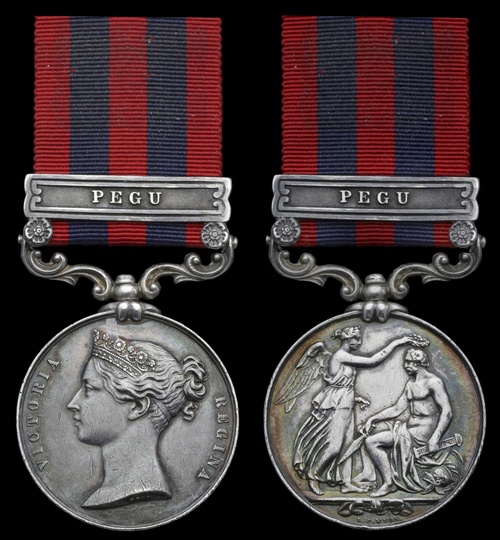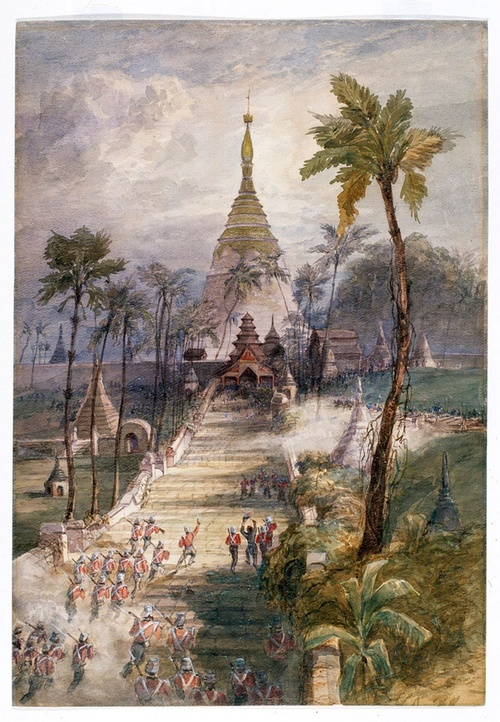Auction: 20002 - Orders, Decorations, Medals & Space Exploration
Lot: 30
The India General Service Medal awarded to Private J. Pollard 18th (Royal Irish) Regiment, later 87th Regiment, Peshawur Light Horse, 5th Bengal European Light Cavalry and 19th Hussars, who saw further active service during the Indian Mutiny and on the Northwest Frontier
India General Service 1854-95, 1 clasp, Pegu (John Pollard. 18th Royal Irish Regt.), a little wear overall, very fine
John Pollard enlisted in the 18th Regiment on 1 January 1849 and probably joined the Regiment at Meerut at the end of the year. He would soon see hot action during the Second Burma War, with the unit first seeing action on 5 April at Martaban when they were the first to storm the wall under over of the bombardment. Captain Gillespie is noted as the first in, with the Grenadier Companies and the 80th Regiment in the fold too. Having secured Moulmein, they were again engaged at Rangoon when they assisted the Bengal Sappers and the Bluejackets get through the thick jungle to get their ladders onto the White House stockade. On 14 April they were faced with the magnificent Shwe-Dagon pagoda. A fiercely protected bastion, the spectacular 14th century pagoda was defended by cannon over its three main tiers, in addition to being protected by a brick and mud rampart. The force chosen to storm the Pagoda comprised a detachment of the 80th, two Companies of the 18th (Royal Irish) Regiment and some troops from 40th Bombay Native Infantry.An approach march having been made before dawn through jungle, the ranks of the storming party readied themselves for the attack. James Jones's History of the South Staffordshire Regiment (1705-1923) takes up the story:
'The distance to be covered in the advance to the eastern entrance of the Pagoda was 800 yards. The troops crossed steadily under a heavy fire from the walls crowded with the enemy. When the storming party reached the Pagoda steps, a rush was made for the upper terrace, and a deafening cheer told that the Pagoda was won. The enemy evacuated the place in great confusion, and were severely handled by the troops and the fire from the steamers on the river.'
They latterly found themselves under siege at Prome in August-October 1852 and in November two Companies were sent out to the districts on patrol to locate enemy. With a force cornered at Tomah, the British waited until March 1853 for reinforcements for a full scale attack, which eventually cost the 18th 1 killed and 28 wounded. The Regiment sent Companies onto the Tonghoo Pass to shepherd a delivery of 148 elephants over the pass. Others were sent out against Myat Toon and were part of the main attack on his stronghold on 19 March, when a frontal attack with the Sikhs secured the victory. Once peace stopped the field operations, the unit was returned to Calcutta, depleted by 365 casualties over the course of the operations.
Pollar transferred to the 87th (No. 3835) and was with them at Ferozepore and Rawalpindi during 1854. With the outbreak of the Indian Mutiny, he served with the unit (Medal without clasp) during the operations. Their role was important in capturing and quelling the numerous outbreaks of mutiny and disorder amongst the troops on the Northwest Frontier and the unit was also charged with carrying out the execution of numerous mutineers. Subedar Major Seetal Mistra, 51st Native Infantry was the first to be put to death on their parade ground at the garrison. They were later required to blow mutineers away by guns.
With the military power in the balance on the Northwest Frontier, Pollard became a founding member of the Peshawur Light Horse on 3 June 1857, one of 36 men from the unit. He was subsequently awarded the India General Service Medal with clasp 'Northwest Frontier' for service at Sittana in 1858 but despite the medal being issued by the Royal Mint, it was returned as undelivered (WO100/20 & 108 refers). Remaining with them until February 1859 he joined the 5th European Bengal Cavalry (WO100/39 refers) until they were disbanded, with Pollard joining the ranks of the 19th Hussars (No. 336). Returned to England, Pollard served at Canterbury and was attached to the 34th (Cumberland) Regiment from April-June 1871. He died suddenly at Shorncliffe on 21 October 1871 and was survived by his wife and a daughter; sold together with a detailed file of copied research with full extracts.
Subject to 20% VAT on Buyer’s Premium. For more information please view Terms and Conditions for Buyers.
Sold for
£210
Starting price
£140







